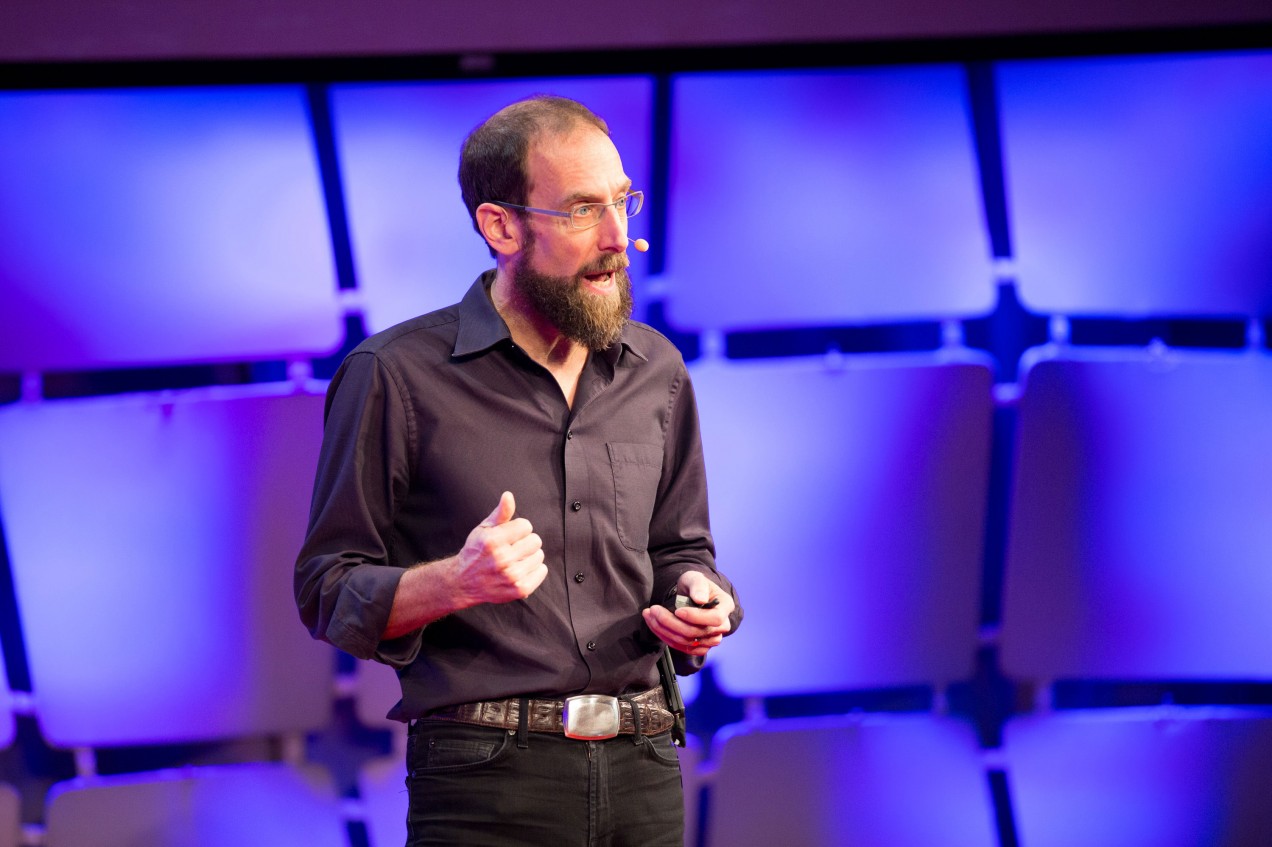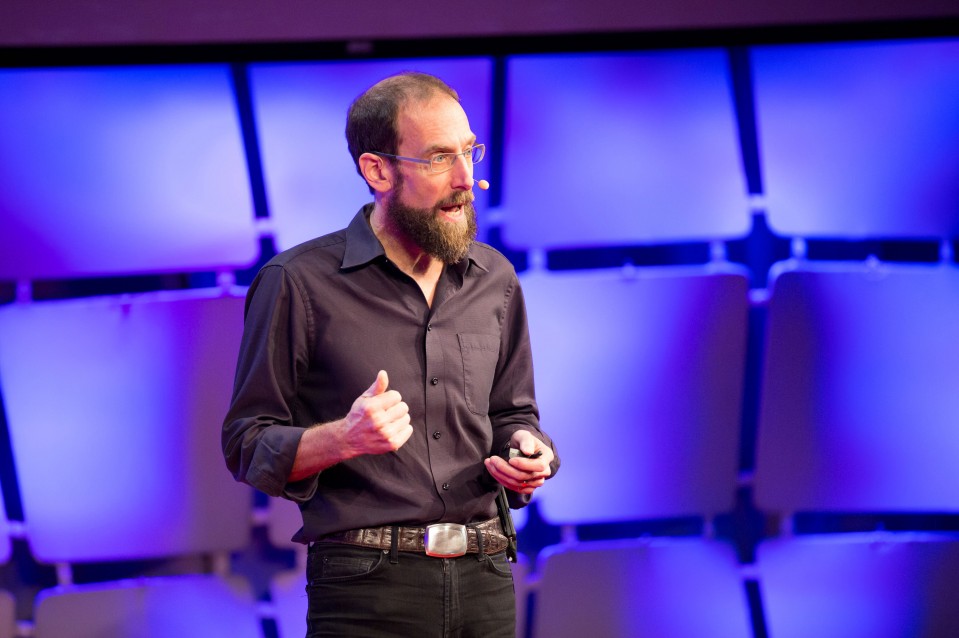

Climate Change / Geoengineering
How one climate scientist combats threats and misinformation from chemtrail conspiracists
Harvard geoengineering researcher David Keith explains when to feed the trolls and when not to.

Last spring, Harvard climate scientist David Keith announced that he and a colleague intended to proceed with small-scale geoengineering experiments in the real world (see “Harvard scientists moving ahead on plans for atmospheric geoengineering experiments”).
The basic idea behind the technology they’re studying, known as solar geoengineering, is that spraying certain particles into the stratosphere could reflect enough heat back into space to offset some level of global warming. But the move from lab research to atmospheric experiments has sparked controversy.
Among other concerns, critics argue it’s far too dangerous to consider tinkering with the global climate system. But the field, and Keith’s research in particular, has also gotten ensnared in conspiracy theories about “chemtrails.” Proponents assert that the condensation trails created by aircraft are actually evidence that the military, or someone, is already spraying chemicals into the sky for wide-scale weather modification, mind control, or other nefarious purposes.
Keith’s plans are actually modest. A high-altitude balloon about 20 kilometers above Earth will spray less than a kilogram of particles, likely including sulfate and calcium carbonate. But measuring how the materials alter the chemistry in the stratosphere can help scientists refine their computer models and more accurately predict the impacts of large-scale geoengineering.
Keith says initial flights to evaluate the systems are now likely to begin in the spring of 2019, with the actual experiments more likely to start that fall. The scientists are in negotiations with several balloon vendors, the results of which will ultimately determine the location of the experiments. The team is also in the process of setting up an independent advisory committee that will review proposals and provide feedback to the university and research team on potential environmental risks, the need for stakeholder engagement, and other issues.
Though chemtrail theories have been repeatedly debunked, they’re surprisingly widespread. A study published in Nature found that up to 40 percent of Americans believe these theories are “completely” or “somewhat” true. Such “conspiratorial views” also accounted for around 60 percent of the conversation about geoengineering on social media. Keith himself regularly receives hateful messages, and even threats of physical violence, as a result of his research.
In an interview with MIT Technology Review, Keith says the widespread misinformation has already complicated his work and infected the public debate over geoengineering.
(This interview has been edited for length and clarity.)
Q: In recent months, Naomi Wolf, the feminist author and progressive political advisor, has begun circulating chemtrail theories and inaccuracies about your proposed experiment on Twitter. Do you worry this could be, as I believe one of your peers put it to me, a Jenny McCarthy moment for chemtrails? Something that could tip it into mainstream misunderstanding, like autism and vaccines?
A: I think it’s already mainstream. Depending on how you ask the question, 30 percent to 40 percent of Americans believe in it.
But yes, my initial reaction was horror. As it happens, my mom is a feminist scholar, so I’d paid attention to some of those books and thought of [Wolf] as a serious person.
But it turns out she’s believed a bunch of other really outrageous conspiracy stuff. So when I started to see that and saw there were already major articles in serious publications that say she’s gone off the deep end, separate from this issue, it seems she doesn’t carry the weight she would have 15 years ago.
But I am worried, full stop, that chemtrail concerns are bleeding over into solar geoengineering in a way that will make it much harder to have a sensible conversation.
Q: Has there been anything different in the reaction as you switched from talking about doing modeling to talking about doing experiments in the real world?
A: Yeah, it’s funny—I think in a way the answer is not at all, because in their view of the world there’s something massive already happening. So our small-scale experiment makes no difference; a one-kilo experiment doesn’t change anything.
Q: Have chemtrail conspiracy theories complicated your ability to do research?
For us, it’s definitely already causing us some trouble, in the sense that we’ve taken time and even money to talk to Harvard security people and think about physical security measures for us. And I think it is making some people nervous about working on this topic, because they’re worried about physical security. I think we’ll have to take extra time to think about physical security when we do the experiment or have meetings.
On the other hand, so far, every time I’ve actually met face to face with chemtrails people, it’s been actually moderately respectful. There have been real conversations, with some voices raised but not anything physical, and actually some sense that people were hearing each other.
I’ve gotten wildly ugly, anti-Semitic, just pure hate out of the internet. But I think, luckily, there’s a huge gap between what people will say over the internet and what they’ll do in person.
Q: What kinds of threats have you received?
A: I’ve received hate mail that says I should be killed or I should die for my sins or whatever, pretty often. Once every week or two I get one that’s pretty ugly. I’ve twice had circumstances where we did call the police. The times when we call the police are when people say I am going to do this and are foaming at the mouth with absolute hate.
Q: How should scientists confront this kind of misinformation about their research?
A: I don’t think that being passive all the time is the right answer. Obviously some of these seem like debates we shouldn’t need to have, but if a significant fraction of the population is having them, we need to engage.
Q: Is there a risk that in weighing in, you can elevate nonsense to a level where it seems, in the public mind, a topic worthy of debate?
A: When people weigh in in a thoughtful way and try to think about where the people who hold these views are coming from politically, intellectually—I think it can make a difference. I guess I have faith in rational debate.
I mean, what’s the alternative—not to talk about it? That seems like that just amplifies conspiracy theories.
Q: Have your views on this changed over the years?
A: I don’t think my personal view has changed that much, but I’ve started to think we need a more organized way to engage with them. There was an early meeting at the University of Calgary where we invited a bunch of them in to talk. I actually wanted to run a similar meeting at Harvard, but other people in the Harvard program thought that was a bad idea.
Q: What would a more organized response look like?
A: Tough to know. What’s clear is that, to a substantial extent, people believe things for kind of tribal reasons, because the person saying them identifies like them, and not so much based on fact (see “How the science of persuasion could change the politics of climate change”).
I think what we need is a not a single organization, but a linkage between or a coalition of different debunking efforts. We need people with very different political stripes to show that they agree in the debunking.
Also, I think we need all of our voices to call out, frankly, Facebook for still allowing Infowars and similar sites to profit by spreading misinformation. Because profit is definitely part of it.
Q: Has there been feedback from the, for lack of a better term, reasonable side of the criticism that has ended up affecting your thinking for the experiment?
A: Oh, for sure. Having this very elaborate advisory board is—no question—partly because of the high level of scrutiny. The broad debate about what sorts of research to do on solar geoengineering is certainly influenced, and should be, by a range of viewpoints and concerns.
It’s actually kind of funny—the ETC Group, the strongest opponent of research, says their underlying concern is justice for the Global South. And I’ve actually come around, and I think many other people have, to thinking that’s precisely the reason to push forward with developing solar geoengineering. It’s something that’s particularly helpful to the Global South because it’s cheap enough that, in fact, it’s something that won’t just be controlled by elites in the North.
My views are obviously opposite ETC’s, but I think ETC helped to raise those concerns in a useful way.
Q: Do you remain confident that, even in today’s reality-challenged age, truth wins out in the long run?
A: Yeah, I do, actually. Rationality is better than the alternatives.